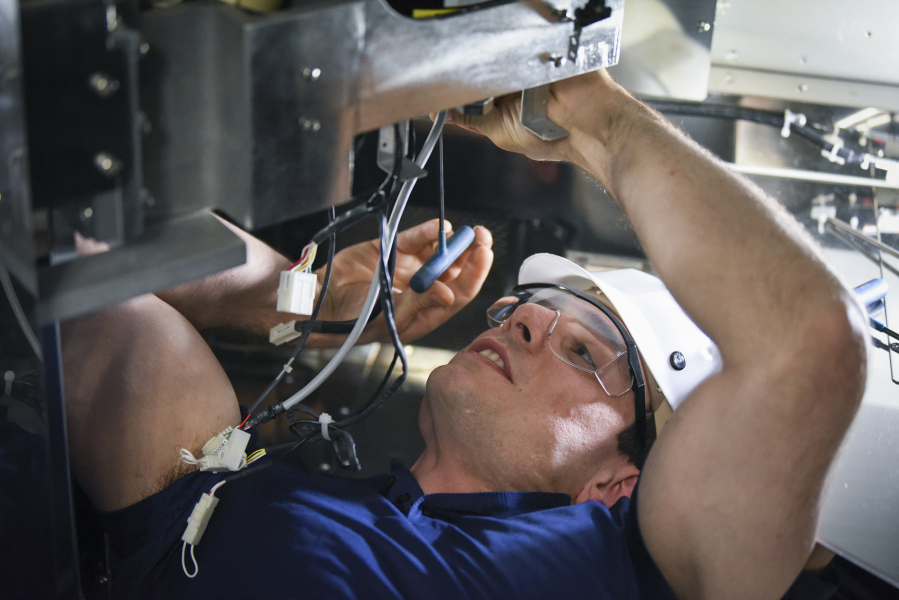When Bob Hale makes the drive to Naval Base Kitsap in Bremerton, he’s aiming to recruit some newly discharged servicemen and women into a booming line of work.
For the past 18 years, Hale has worked for a company that plays an important role in the semiconductor industry: Kokusai Semiconductor Equipment Corp. Headquartered in San Jose, Calif., with an office in east Vancouver, it sells and services massive furnaces vital in the making of microchips.
The gray-haired U.S. Navy veteran jokes that it’s not so easy to get young veterans to talk to him if they see him at a job fair next to booths for Amazon, Microsoft and SpaceX. “I’m not as sexy as Elon Musk,” he said.
But, thanks to a booming semiconductor industry, Hale is looking to be a little more assertive in hiring. Kokusai is on pace for record sales this year and plans to add employees.
About Kokusai
• Company name: Kokusai Semiconductor Equipment Corp.
• Product: Semiconductor equipment, such as vertical diffusion furnaces.
• Local office: 1211 S.E. Cardinal Court.
• Veterans employed: 54 (36 Navy, 7 Army, 6 Marines, 5 Air Force).
• For more information: 360-828-3650.
All the new jobs could go to veterans. Kokusai, sometimes dubbed “U.S.S. Kokusai” by the many Navy veterans who work there, is comprised mostly of people with military experience.
Hale expects to keep that trend alive. Though their r?sum?s may be light on internships or customer service skills, veterans bring technical knowledge and resiliency to high-stress conditions. Combined with a hard-won work ethic, Hale said they are invaluable.
“This industry is driven by technical competence, and there is a lot of that in the military,” he said. “Common sense isn’t that common.”
Boot camp for furnaces
Shane Hoffman spent last Friday under the myriad hoods of a vertical diffusion furnace.
The furnaces are as big as the shipping containers loaded on ships, trucks and trains, but the insides looks like a photocopier on steroids. Boxes of circuits are everywhere.
The furnace’s robotic arms sort and file big, obsidian-colored discs — wafers of silicon — which are then introduced to heat and a mix of gases that make them valuable in the semiconductor supply chain.
“They’ve got every type of engineering discipline you can think of” to operate, Hale said. “And we expect (technicians) to be an expert in front of the customer in six months.”
That wasn’t exactly Hoffman’s forte. Before leaving the U.S. Marine Corps, the 25-year-old learned to fix and maintain radio systems at Camp Lejeune, N.C. Though he knew nothing about semiconductors, Kokusai sought out employees like him.
“Honestly, the industry was not very well known to me,” said Hoffman, who now provides full-time maintenance support to a semiconductor company in New York. “Then I was like, ‘Wow, this is a huge industry.’ It was kind of hidden to my eyes.”
Hoffman and other veterans are prized for their ability to be trained. Dan Petrie, director of site operations and another U.S. Navy veteran, said men and women learn quickly if they are told to stand watch for six hours and then work for another six.
“You need these people now, and you’ve gotta get ’em trained quickly,” he said. “Military people are good at that. That’s what we did. Hell, we trained 75 percent of the time.”
It’s not just enough to be a fast learner, though. Working with the furnaces can be dangerous. Workers can and have fallen from ladders while working on the upper portions of the tall furnaces. And the gases are pyrophoric, meaning they combust if they contact the outside air.
“People who don’t know the industry don’t realize that we do work with very volatile chemicals, explosive gases, and the wrong mixture can seriously injure or kill somebody,” said Martin Rodriguez, training manager.
That said, the most common injury is nothing more serious than a twisted back, Petrie said.
Because the company hopes to be valued for its customer service, too, some technicians are tasked with getting on a plane at a moment’s notice. That quality is found more readily in veterans, Hale said, because they are “mission-oriented.”
“Our military guys don’t have a problem traveling,” said Petrie. “You need me to go to Singapore? OK, I’m gone. China? Gone.”
Work at Kokusai is not exclusive to veterans. A small contingent of workers graduated from technical colleges. The administrative staff, which has grown, is made up mostly of civilians.
On overdrive
There is an urgency now to get more veterans hired and trained. The company will bring aboard seven more veterans in 2018 and put them through a six-month training regimen.
Much of that is driven by the breakneck pace with which microchips are being bought and sold. They are built into almost every modern product. Massive data centers — the storehouses of the ubiquitous “cloud” storage — and the computerization of everything from cars to thermostats to blenders have put demand for silicon chips on overdrive.
According to the Semiconductor Industry Association, sales of semiconductors will hit $400 billion this year. Its July-to-September fiscal quarter was also its highest-selling quarter on record.
“Chip sales are going through the roof,” said Kokusai president Rob Bernardi.
While that doesn’t directly impact Kokusai, owned by Tokyo-based Hitachi Kokusai Electric, they are finding their services more in demand than ever. Semiconductor equipment makers are expected to sell $55 billion worth of products next year.
Bernardi wouldn’t disclose Kokusai’s revenue figures, but said they are on pace to gain 39 percent this year. They also expect to break the record for revenues set in 2014.
A big reason for that, he said, are the on-site technicians. Kokusai isn’t as large as some of its competitors, but he said they have a lot of pride. That is founded on its technicians, he said.
“I have a lot of admiration for them,” he said.




